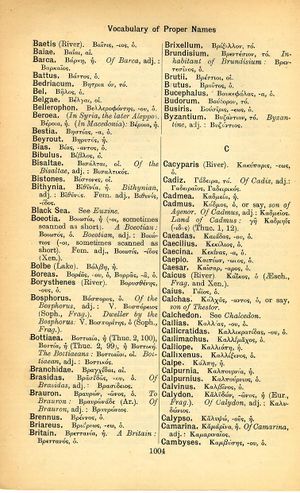Briareus
γλυκύ δ᾽ἀπείρῳ πόλεμος, πεπειραμένων δέ τις ταρβεῖ προσιόντα, νιν καρδίᾳ περισσῶς → A sweet thing is war to the inexperienced, but anyone who has tasted it trembles at its approach, exceedingly, in his heart (Pindar, for the Thebans, fr. 110)
English > Greek (Woodhouse)
Βριάρεως -εω, ὁ.
Latin > English (Lewis & Short)
Brĭăreus: (trisyl.), ei, m., = Βριαρεύς, Callim. Del. 143 (old form Βριάρεως, Hom. Il. 1, 403; v. Crus. Wb. of Prop. Names),
I the hundred-armed giant, also called Ægœon: centumgeminus, Verg. A. 6, 287 Serv. and Heyne; cf. id. ib. 10, 565: ferox, Luc. 4, 596 Schol.: immensus, Stat. Th. 2, 596; cf. also Ov. M. 2, 10; Claud. Laud. Stil. 1, 304: vastus, Sen. Herc. Oet. 167.—Hence, Brĭă-rēĭus, a um, adj., of or belonging to Briareus: turba, Claud. Rapt. Pros. 3, 188.
Latin > French (Gaffiot 2016)
Brĭăreūs,¹⁴ ĕī ou ĕos, m. (Βριαρεύς), Briarée ou Égéon [géant qui avait cent bras] : Virg. En. 6, 287 || -rēĭus, a, um, de Briarée, des géants : Claud. Pros. 3, 187.
Latin > German (Georges)
Briareus, eī, m. (Βριαρεύς = der Furchtbare), von den Menschen Aegaeon (s.d.) gen., ein Uranide, nach andern ein Gigant, mit hundert Armen und fünfzig Köpfen, dah. Br. centumgeminus, Verg. Aen. 6, 287; vgl. 10, 565: Br. ferox, Lucan. 4, 596. – Dav. Briarēius, a, um, briarëisch, turba, Claud. rapt. Proserp. 3, 188: praeda, Rutil. Nam. 1, 6, 3.

